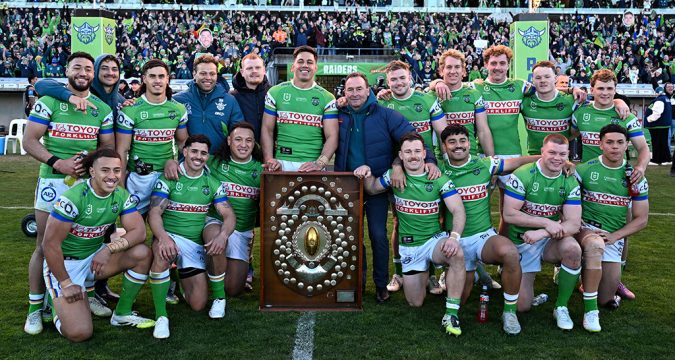How a game can turn
Watching the clash between St Helens and Wigan on Friday night, I was struck by how a game that seems to be dominated by one team can turn because of one particular incident.
For 27 minutes St Helens had been absolutely outstanding, despite missing two key players in Morgan Knowles and George Delaney.
Jack Welsby was acquitting himself brilliantly at loose forward, standing in for Knowles, and he had already created a try for Deon Cross with a brilliant pass early in the game that had put Saints four points ahead.
On 27 minutes he made another break and slung another pass to Cross, but this time it fell too low for the winger to be able to collect it and score.
Nonetheless at that point in the game St Helens had been playing a blinder and it only looked to be a matter of time before they would increase their lead.
But two things happened that would suddenly change that impression.
In fact one of them had already happened, when Junior Nsemba replaced Liam Byrne in the Wigan pack in the 20th minute.
But the effect of that substitution was only seen eight minutes later and it came immediately after Daryl Clark conceded a penalty on Harry Smith, giving Wigan a sudden respite from the pressure they had been under.
Forty-five seconds later Liam Farrell made a searing break downfield and, fifteen seconds after that, Nsemba got the ball in his hands about 20 metres from the St Helens line and was able to feed it to Jake Wardle, who had a clear run to the line.
It was as though the confidence that St Helens had been playing with was to suddenly drain away from them.
Soon after that, Tristan Sailor knocked on a bomb under pressure from Bevan French and less than two minutes later Wigan were in again and it was Nsemba once more doing the damage.
This time he reached high to brilliantly take a huge bomb from Smith and was somehow able to audaciously pass the ball to Liam Marshall, who was able to stroll over the line to give Wigan the lead, with Smith kicking the goal.
You could see that Saints were rattled by the fact that Mark Percival was pulled back for an incorrect play-the-ball shortly before Curtis Sironen conceded a penalty in the tackle for Smith to take it to 12-4, which was the half-time score.
So when Bevan French picked up a Percival grubber and fed Jai Field for Wigan’s third try on 44 minutes, it looked as though Wigan could run away with it.
To Saints’ credit, they didn’t allow that to happen, but they never really looked like getting back on terms.
But it did illustrate how seemingly innocuous penalties can turn a game.
Who knows what might have happened if Clark hadn’t conceded one on 27 minutes.
The growth of the NRL
The NRL will begin its play-offs this Friday, when Melbourne Storm play host to Canterbury Bulldogs.
The NRL’s boast is that the play-offs this season will take place in five major cities – Melbourne, Auckland, Sydney, Canberra and Brisbane.
And with no competition from the AFL (Aussie Rules) in Melbourne this weekend, it would be a surprise if the Storm didn’t sell out their home game at AAMI Park.
It set me thinking about the remarkable progress Rugby League has made in Australia in the last 60 years, particularly when compared to the same period in England.
None of the four clubs that will host finals this weekend existed 60 years ago.
The dates they came into the senior competition were as follows: Cronulla (1967), Canberra (1981), New Zealand Warriors (1985) and Melbourne (1998). And they will all sell out their stadiums this weekend.
It’s a remarkable story of expansion, which will continue in the forthcoming years when teams from Perth and Papua New Guinea will enter the NRL.
In fact if we think back 60 years, to 1965, we find that many British clubs are drawing lower crowds now than they were in those days.
It’s a story of success set against a story of stagnation, apart from in the case of a small number of successful clubs in this country.
A Peach of a Comment
Sinead Peach clearly said something she shouldn’t to a referee last week, when she was playing for York Valkyrie against St Helens.
The referee was Oliver Salmon, who dismissed Sinead from the field and repeated the comment she had made to him, which was suggesting colloquially that he was rather too close to some of the St Helens players.
Of course Sinead shouldn’t have said it and she now faces a potential six-match ban for her indiscretion.
Nonetheless, her actions generated more publicity for Women’s Rugby League than anything else I’ve seen recently.
It may not be the best sort of publicity, but apparently millions of people have viewed it on various social media channels.
And at a time when the Women’s Rugby World Cup is taking place in England, giving the impression that there is only one code of women’s rugby, that isn’t necessarily a bad thing, although I don’t suppose that thought will do her much good when she faces an RFL Tribunal on Tuesday.

